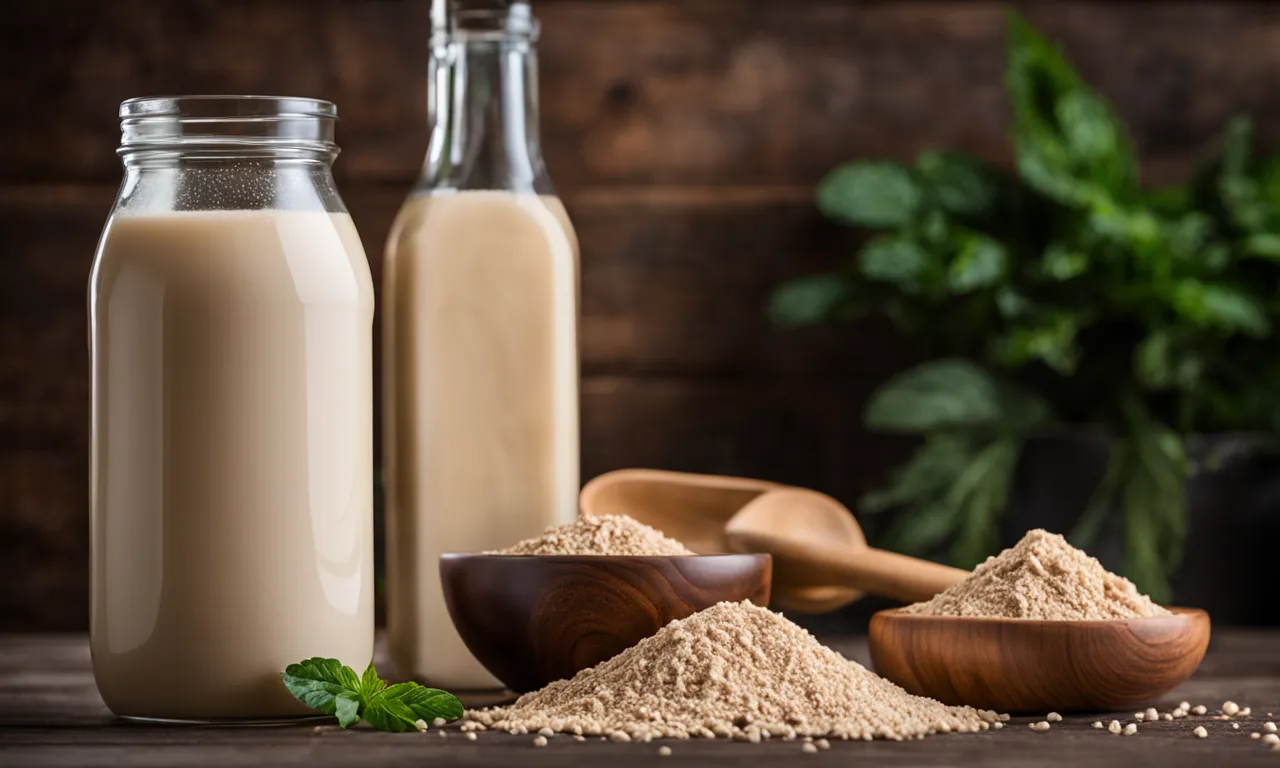Is Whey Protein Vegetarian? Examining Its Sources And Production
Whey protein has become a nutritional powerhouse for athletes and fitness enthusiasts looking to build muscle mass. But if you follow a vegetarian diet, you may be wondering – can you consume whey protein?
If you’re short on time, here’s a quick answer to your question: Whey protein is not vegetarian because it is derived from milk, which is an animal product.
In this comprehensive guide, we’ll explore what whey protein is, its sources and production methods, and vegetarian-friendly protein alternatives to determine if whey protein aligns with a vegetarian lifestyle.
Understanding the Basics of Whey Protein
Whey protein is a popular supplement commonly used by athletes, fitness enthusiasts, and individuals looking to increase their protein intake. It is derived from milk and is known for its high nutritional value and quick absorption by the body.
To fully grasp the concept of whey protein, it is important to understand its definition, its role in milk and cheese production, as well as the different types available in the market.
Definition of Whey Protein
Whey protein is a mixture of proteins that are separated from the liquid part of milk during the cheese-making process. It is considered a complete protein, meaning it contains all the essential amino acids that the body needs.
Whey protein is highly regarded for its ability to promote muscle growth and repair, enhance exercise performance, and support overall health and well-being.
Role in Milk and Cheese Production
Whey protein is a byproduct of cheese production. When milk is coagulated to make cheese, the solid curds separate from the liquid whey. This liquid whey is then processed to remove impurities and further concentrated to obtain whey protein.
The whey protein obtained from this process undergoes filtration and drying to create the powdered form that is commonly found in protein supplements.
It is important to note that the production of whey protein does not cause harm to animals. The whey is collected as a byproduct of the cheese-making process, ensuring that no animals are harmed or killed solely for the production of whey protein.
Types of Whey Protein
There are three main types of whey protein available on the market: whey protein concentrate, whey protein isolate, and whey protein hydrolysate.
- Whey protein concentrate (WPC): This type of whey protein contains low levels of fat and carbohydrates and is typically around 70-80% protein. It is a cost-effective option and is commonly used by individuals looking to increase their overall protein intake.
- Whey protein isolate (WPI): WPI undergoes further processing to remove most of the fat and lactose, resulting in a higher protein content of around 90-95%. It is suitable for individuals who are lactose intolerant or have strict dietary restrictions.
- Whey protein hydrolysate (WPH): WPH is a pre-digested form of whey protein that has undergone enzymatic hydrolysis. This process breaks down the protein into smaller peptides, making it easier for the body to absorb and utilize. WPH is often used in specialized sports nutrition products.
It is worth noting that the choice between these types of whey protein ultimately depends on individual preferences, dietary requirements, and fitness goals.
For more information on whey protein and its benefits, you can visit www.healthline.com or www.bodybuilding.com.
Whey Protein Production Methods
Extracted from Milk or Cheese
Whey protein is derived from milk or cheese production. During the cheese-making process, milk is first coagulated to separate solid curds from liquid whey. The whey is then collected and undergoes further processing to extract the protein content.
This extraction process typically involves filtration and separation techniques to isolate the whey protein.
Further Processed and Purified
Once the whey protein is extracted, it undergoes additional processing and purification steps to enhance its purity and remove any impurities. These steps may include microfiltration, ultrafiltration, and ion-exchange chromatography.
The goal is to obtain a high-quality whey protein isolate or concentrate with a high protein content and minimal fat and lactose content.
Hydrolyzed Whey Protein
In addition to whey protein isolates and concentrates, there is another form known as hydrolyzed whey protein. This type of whey protein undergoes a process called hydrolysis, where it is broken down into smaller peptides and amino acids.
Hydrolyzed whey protein is often preferred by individuals with digestive issues or those who require rapid protein absorption due to its easier digestibility and faster absorption rate.
It is important to note that the production methods for whey protein may vary depending on the manufacturer and the specific product. Some manufacturers may use additional processing steps or variations in their production methods to achieve specific characteristics or cater to different dietary needs.
For more detailed information on whey protein production methods, you can visit reputable sources such as NCBI or ScienceDirect.
Examining the Ethics of Whey Protein
Vegetarian Status Debated
When it comes to the vegetarian status of whey protein, there is often a heated debate among individuals following a vegetarian diet. Whey protein is derived from milk, which is obtained from animals such as cows.
While whey itself is a byproduct of cheese production, some argue that since it comes from an animal source, it cannot be considered vegetarian. Others, however, believe that as long as the animals are not harmed or killed in the process, whey protein can still be considered vegetarian-friendly.
It’s important to note that there are vegetarian-friendly alternatives to whey protein available in the market. Plant-based proteins, such as pea protein or soy protein, are excellent options for individuals who prefer to avoid animal products altogether.
Animal Welfare Concerns
One of the main ethical concerns surrounding whey protein is the welfare of the animals involved in its production. Dairy cows, from which milk is obtained, are often subjected to intensive farming practices that may not prioritize their well-being.
These practices can include confinement, over-milking, and separation from their calves. As a consumer, it is essential to be aware of the sourcing practices of the whey protein you choose to purchase.
Opting for brands that prioritize animal welfare and follow ethical farming practices can help alleviate these concerns.
For those who are concerned about animal welfare, exploring alternative protein sources like plant-based proteins can be a viable option. These options not only provide a cruelty-free alternative but are also rich in essential nutrients and amino acids.
Environmental Impacts
In addition to animal welfare concerns, the production of whey protein can also have environmental impacts. The dairy industry, which is the primary source of whey protein, contributes to greenhouse gas emissions, water pollution, and deforestation.
The large-scale farming of dairy cows requires significant amounts of land, water, and feed, which can lead to environmental degradation.
Choosing sustainably sourced whey protein from brands that prioritize eco-friendly practices can help mitigate these environmental impacts. Additionally, exploring plant-based protein options can further reduce your carbon footprint and contribute to a more sustainable food system.
Vegetarian-Friendly Alternatives to Whey
Soy Protein
Soy protein is one of the most popular alternatives to whey protein for vegetarians. It is derived from soybeans, making it a plant-based protein source. Soy protein is considered a complete protein, meaning it contains all nine essential amino acids that the body needs.
It is also low in fat and cholesterol-free, making it a healthy choice for those following a vegetarian or vegan diet. Soy protein is available in various forms, including powders, bars, and shakes, making it easy to incorporate into your daily routine.
Pea Protein
Pea protein is another excellent vegetarian-friendly alternative to whey protein. It is made from yellow peas and is a high-quality source of protein. Pea protein is hypoallergenic and easily digestible, making it suitable for individuals with dietary restrictions or digestive issues.
It is also rich in branched-chain amino acids (BCAAs), which are essential for muscle growth and repair. Pea protein is commonly available in powder form and can be used in smoothies, baked goods, or as a supplement to boost protein intake.
Hemp Protein
Hemp protein is derived from the seeds of the cannabis plant. It is an excellent choice for vegetarians looking for a complete protein source. Hemp protein is rich in omega-3 fatty acids, fiber, and essential minerals like magnesium and iron.
It is also easily digestible and hypoallergenic, making it suitable for individuals with sensitive stomachs. Hemp protein powder can be added to smoothies, yogurt, or used in baking to increase protein content. It has a slightly nutty flavor, which adds a pleasant taste to your recipes.
It is important to note that while these alternatives to whey protein are vegetarian-friendly, individuals with specific dietary requirements or allergies should always read labels and consult with a healthcare professional before incorporating them into their diet.
For more information on vegetarian protein sources, you can visit websites like Vegetarian Times or PETA.
Conclusion
While many bodybuilders use whey protein, it is ultimately not vegetarian due to its dairy origins. The production methods also raise ethical concerns over animal welfare and environmental impacts.
Thankfully, there are many plant-based protein options like soy, pea, and hemp that can allow vegetarians to meet their protein needs while sticking to their ethics. With all the choices available today, vegetarians certainly don’t need whey to build muscle and strength.







